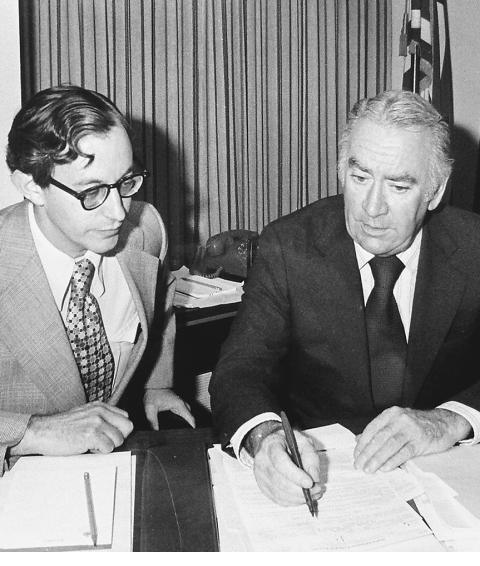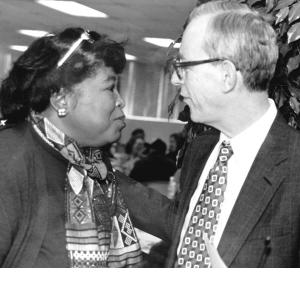Led union for two decades
 |
Irwin Polishook, a founder of the modern PSC whose two-decade presidency helped shape the union’s contractual framework and who lead the union during the fallout from the city’s financial crisis, died on September 13 at the age of 84.
Polishook, who taught colonial American history first at Hunter College and later at Lehman College, helped found the PSC when, in 1972, CUNY’s Legislative Conference and the United Federation of College Teachers merged to form one union. He became the union’s founding vice president, serving under Belle Zeller.
DEEP CUTS
As PSC retiree activist Irwin Yellowitz explained, Polishook led the charge against an attempt by the state to cut City College, Brooklyn College, Hunter College and Queens College from the system and transfer the campuses to SUNY in a misguided effort to alleviate CUNY’s devastated finances. “He was a major force against the dismemberment of CUNY,” Yellowitz said.
Polishook tried to stop the laying off of individual professors, although some departments were closed down and several thousand were laid off (some were brought back), and won the repayment of two weeks’ lost pay, with interest, when faculty and staff were put on furlough in 1976. “No one said it could be done,” Yellowitz said, noting that it took seven years for all the money to be repaid.
GETTING THE GOODS
Polishook was also important in strengthening CUNY faculty and staff benefits. Perhaps most important, he pressed the city to contribute to TIAA pensions rather than solely to the city-controlled Teachers’ Retirement System. His team also revamped the PSC-CUNY Welfare Fund.
Through Polishook’s efforts, the union now has the majority of appointees to the Fund’s board, giving the union and the membership a significant say in how the fund’s benefits are managed.
Writing in the PSC’s Retiree Chapter newsletter, Yellowitz said, “It had been an independent body, and the union opposed some of its policies as being too limited to serve the entire faculty and staff.”
 |
The union, under Polishook, played an important role in combating gender discrimination at CUNY. When an assistant professor of English at Brooklyn College, Lilia Melani, embarked on what would become a class action lawsuit against the university for paying women instructors less than their male colleagues (filed in 1973), she originally did not go through union channels. When Melani sought representation from prominent labor lawyer and civil rights advocate Judith Vladeck, however, the union agreed to pay the legal fees. A federal judge ruled against CUNY in 1983, resulting in $60 million in damages and back pay.
Austerity began to deepen even after the city eventually recovered from the financial crisis of the mid-’70s, most notably in 1989 when both the city and state faced budget deficits. Polishook advocated for the faculty and staff, as quoted in the New York Times, “Class size has risen dramatically, the faculty workload is much higher than that at comparable research universities, support services have been shredded and library purchases are at a minimum.”
ROUGH YEARS
The 1990s were tumultuous for the PSC. Beginning with Governor Mario Cuomo and continuing with Governor George Pataki, in addition to a right-wing City Hall with Mayor Rudy Giuliani, the university faced ongoing budget cuts that inspired longtime and tenured faculty to seek employment elsewhere, according to news reports at the time. The union saw several 0-percent raises in the 1990s.
CHALLENGED
The drama of the 1990s led to the first contested PSC presidential election in 20 years with Brooklyn College political scientist Steve London running with the New Caucus. London would later serve as PSC first vice president and he is currently a PSC executive council member.
Speaking to Clarion, London said, “Among Polishook’s chief accomplishments were maintaining the unity of the union and maintaining the structure of the University. But during the 1990s, the pressures were very severe and he responded with policies that were inadequate to deal with the salary structure of full-timers and the increasing use of adjuncts.”
Polishook retired in 2000, just before the next PSC leadership election. Barbara Bowen, who was the Queens College chapter chair at the time, and challenged Polishook’s policies, won the presidency with the support of the New Caucus.
LEGACY
As Yellowitz explained, Polishook’s legacy at the PSC is rooted in the fact that he aggressively bargained contracts.
In addition, Yellowitz noted, Polishook will be remembered for being not just a CUNY faculty and staff leader, but someone who used his role as a leader in the PSC, AFT and the New York State United Teachers to advocate for public higher education in the same way the labor movement would fight for other essential public services.
“He is credited with the PSC being a solid union,” Yellowitz said, “the leading union in higher education.”
According to his obituary, donations in his memory may be made to the Belle Zeller Scholarship Trust Fund, which provides an annual graduate scholarship in his name. (Send c/o PSC, 61 Broadway, New York, NY 10006).

